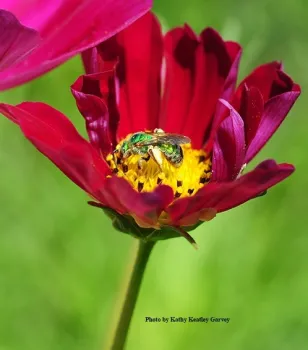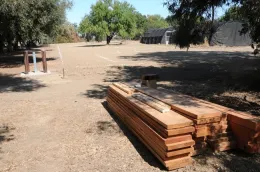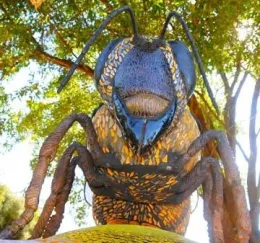
All classes, taught by Haven manager Christine Casey, are offered as either remote ($25 registration) or hybrid remote/in-person ($40 registration). All proceeds support the Haven.
Excerpts from the Bee Haven website:
I Planted a Bee Garden: Now What?
Saturday, April 1, 2023, 9 to 10:30 a.m.
Many California gardeners are removing their water-hungry turf and replacing it with lower-water plants that provide food and habitat for bees and other animals. But if all you know about garden maintenance is how to start the lawnmower, deciding what to plant and learning how to maintain it can be daunting.
Aimed at beginning bee gardeners, this class will cover the basics of turf conversion and weed control along with plant selection for bees and other pollinators. We'll also cover maintenance of a turf yard compared to planted borders.
Registration links: remote class or remote/in-person class.
Advanced Bee Gardening
Saturday, April 22, 2023, 9 to 10:30 am
This class is for experienced gardeners who want to better support bees in their gardens. We'll discuss garden design and plant selection based on bee biology as well as how to encourage insect natural enemies to keep bee gardens pesticide-free. We'll also learn about some of the latest research on bees and gardens and how to incorporate this into your garden. The class will conclude with a tour of the Haven for a hands-on look at plants and bees.
Registration links: remote class or remote/in-person class.
Collecting Bees Through Photos
Saturday, April 1, 2023, 11:30 a.m. to 1 p.m.
Bees are fascinating animals, and many people are intrigued by the idea of having their own bee collection for closer observation. An effective way to ‘collect' bees without harm is by making a bee photo album. We'll start with an overview of bee anatomy and classification and learn how to distinguish bees from other insects. We'll then look at key features of common bees that can be used to identify them in flight. The class will finish outdoors for hands-on experience observing, identifying, and photographing bees.
Registration links: remote class or remote/in-person class.
The Haven, located next to the Harry H. Laidlaw Jr. Honey Bee Research Facility, is open daily at no charge from dawn to dusk.
History of the Bee Garden.

Häagen-Dazs wanted the funds to benefit sustainable pollination research, target colony collapse disorder, and support a postdoctoral researcher. It was decided to install an educational garden, conduct a design contest, and award a research postdoctoral fellowship to Michelle Flenniken (now with the Montana State University).
A Sausalito team--landscape architects Donald Sibbett and Ann F. Baker, interpretative planner Jessica Brainard and exhibit designer Chika Kurotaki--won the design competition. The garden was installed in the fall of 2009 under the direction of interim department chair Lynn Kimsey, director of the Bohart Museum of Entomology and professor of entomology.
An eight-member panel selected the winner of the design competition: Professor Kimsey; founding garden manager Missy Borel (now Missy Borel Gable), then of the California Center for Urban Horticulture; David Fujino, executive director, California Center for Urban Horticulture at UC Davis; Aaron Majors, construction department manager, Cagwin & Dorward Landscape Contractors, based in Novato; Diane McIntyre, senior public relations manager, Häagen-Dazs ice cream; Heath Schenker, professor of environmental design, UC Davis; Jacob Voit, sustainability manager and construction project manager, Cagwin and Dorward Landscape Contractors; and Kathy Keatley Garvey, communications specialist, UC Davis Department of Entomology.

"The Honey Bee Haven will be a pollinator paradise," Kimsey related in December 2008. "It will provide a much needed, year-round food source for our bees at the Harry H. Laidlaw Jr. Honey Bee Research Facility. We anticipate it also will be a gathering place to inform and educate the public about bees. We are grateful to Haagen-Dazs for its continued efforts to ensure bee health."
The garden, Kimsey said, would include a seasonal variety of blooming plants that will provide a year-round food source for honey bees. It would be a living laboratory supporting research into the nutritional needs and natural feeding behaviors of honey bees and other insect pollinators.
Visitors to the garden, she said, would able to glean ideas on how to establish their own bee-friendly gardens and help to improve the nutrition of bees in their own backyards.
The timeline:
Feb. 19, 2008
Häagen-Dazs Donation to UC Davis
Dec. 8, 2008
Häagen-Dazs Launches Bee Garden Design Contest
Aug. 6, 2008
Insect Virus Researcher Michelle Flenniken Named Häagen-Dazs Postdoctoral Fellow at UC Davis
Feb. 26, 2009
Sausalito Team Wins Design Competition
Aug. 6, 2009
Haagen-Dazs Honey Bee Haven Site Preparation
Aug. 13, 2009
Bee Biology Website to Be Launched
Aug. 13, 2009
Thinking Outside the Box
Sept. 15, 2009
Campus Buzzway: Wildflowers
Dec. 15, 2009
Bee Biology Website Lauded
2010
June 6, 2010
Grand Opening Celebration of Honey Bee Garden
July 15, 2010
Art Is Where the Community Is; Blending Science with Art in the Häagen-Dazs Honey Bee Haven
July 30, 2010
More Than 50 Bee Species Found in Haven: Robbin Thorp (Now there's more than 80 and counting!)
Aug. 25, 2010
Donna Billick: Miss Bee Haven
Aug. 11, 2011
What the Signs Tell Us in the UC Davis Honey Bee Garden
Aug. 24, 2011
Royal Visit to Harry H. Laidlaw Jr. Honey Bee Research Facility
April 11, 2012
Brian Fishback: Spreading the Word about Honey Bees
Aug. 26, 2013
Eagle Scout Project: Fence Around the Bee Garden
Sept. 11 2012
A Fence to Behold
2013
April 25, 2013
UC Davis Bee Team Wins Major Award
Aug. 1, 2013
Häagen-Dazs Honey Bee Haven Place to Be
With photo of founding volunteers
Donors
List of Donors Who Helped Launch the Garden (2009 through July 2014)
Missy Borel, then manager of the California Center for Urban Horticulture (and now Missy Borel Gable, director of the California Master Gardener Program) served as the founding manager, a part-time position. Nineteen volunteers assisted her.
Today the bee garden is the UC Davis Bee Haven. Extension apiculturist Elina Lastro Niño of the Department of Entomology and Nematology, serves as the faculty director of the garden. Christine Casey is the academic program manager. For more information on the garden, access the Bee Haven website or contact beegarden@ucdavis.edu.

